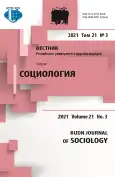Labor market in the UK in digital era: The gender dimension
- Authors: Mosakova E.A.1, Kizilova K.2
-
Affiliations:
- Lomonosov Moscow State University
- Institute for Comparative Survey Research “Eurasia Barometer”
- Issue: Vol 21, No 3 (2021)
- Pages: 512-519
- Section: Contemporary society: the urgent issues and prospects for development
- URL: https://journal-vniispk.ru/2313-2272/article/view/322694
- DOI: https://doi.org/10.22363/2313-2272-2021-21-3-512-519
- ID: 322694
Cite item
Full Text
Abstract
The article considers gender discrimination in the field of labor relations in the United Kingdom (UK) in the pre-covid period. In the past decades, the Western European countries have made the most significant progress in achieving gender equality in various fields, including labor relations, and became the world leader in this area. However, despite all the efforts of the international community, no country has achieved a full gender equality, and Great Britain is no exception. The authors argue that the British anti-discrimination legislation (before leaving the European Union) was based on international acts and conventions. For a long time, there were acts and laws prohibiting discrimination in the labor market, which seriously hindered the implementation of an effective anti-discrimination policy in the sphere of labor relations. It was not until 2010 that the law on equality was passed to replace all previous laws and regulations and to provide an exhaustive list of criteria for prohibiting discrimination. As a result, Great Britain began to develop a rather strict national anti-discrimination legislation in the field of labor relations. Thus, in the past decades, the UK has been achieving gender equality in the economic sphere at a faster pace than the average European Union country. The study shows a steady decline in the gender wage gap in the UK over the past two decades, which may be considered one of the country’s most significant achievements in fighting gender discrimination in the labor market. However, there is still a number of serious challenges: a relatively low female labor force participation and employment rate, a gender wage gap and income gap, horizontal and vertical segregation, a gender gap in postgraduate education, and a significant gender gap in time spent on family responsibilities. Age discrimination presents a special problem in the sphere of labor relations in Great Britain. In the European Union, the first laws prohibiting age discrimination were adopted only in the 2000s, and in the UK - in 2006. This problem still remains extremely acute for the labor market, since age discrimination in the UK ranks third among the most common grounds for discrimination - after gender and disability.
About the authors
E. A. Mosakova
Lomonosov Moscow State University
Author for correspondence.
Email: lizavetam@mail.ru
кандидат экономических наук, доцент кафедры ЮНЕСКО по изучению глобальных проблем факультета глобальных процессов
Leninskye Gory, 1, bldg. 13a, Moscow, Russia, 119991K. Kizilova
Institute for Comparative Survey Research “Eurasia Barometer”
Email: ksenniya.kizilova@gmail.com
заместитель директора Института сравнительных исследований общественного мнения «Евразийский барометр» (Вена, Австрия); руководитель секретариата Исследовательской ассоциации «Мировые ценности» (Стокгольм, Швеция); генеральный секретарь Исследовательского комитета «Сравнительное общественное мнение» Международной политологической ассоциации (Монреаль, Канада)
Paniglgasse 17/7, Vienna, 1040, AustriaReferences
- Bratt C., Abrams D., Swift H. J., Vauclair C. M., Marques S. Perceived age discrimination across age in Europe: From an ageing society to a society for all ages. Development Psychology. 2018; 54 (1).
- Convention Concerning Discrimination in Respect of Employment and Occupation 1958/ URL: https://www.un.org/en/development/desa/population/migration/generalassembly/docs/ global compact/ ILO_C_111.pdf.
- Equality Act 2010. URL: http://www.legis lation.gov.uk/ukpga/2010/15/section/17.
- Gender Equality Report 2020. URL: https://ec.europa.eu/info/policies/justice-and-fundamental-rights/gender-equality_en.
- Gender mainstreaming for health managers: A practical approach. 2011. URL: https://www.who.int/gender-equity-rights/knowledge/health_ manage rs_guide/en.
- Gender wage gap, EU, 2019 // https://data.oecd.org/earnwage/gender-wage-gap.htm.
- Hardy S., Butler M. European Employment Laws: A Comparative Guide. Ongar; 2011.
- Sex Discrimination Act 1975. URL: http://www.legislation.gov.uk/ukpga/1975/65/contents.
- Sustainable Development in the European Union. Monitoring Report on Progress towards the SDGs in the EU Context. Luxembourg; 2019.
- Global Competitiveness Report 2020. URL. https://reports.weforum.org/global-gender-gap-report-2020.
- Transforming our World: 2030 Agenda for Sustainable Development. URL: https://sdgs.un.org/ publications/transforming-our-world-2030-agenda-sustainable-development-17981.
- United Nations Charter // https://www.un.org/en/about-us/un-charter.
- Bazarov B.N. Legal regulation of discrimination in the field of labor law on the example of the European Union and Great Britain. Tribune of Scientists. 2020; 2. (In Russ.).
- Bezsonov V.O. Legal regulation of the prohibition of discrimination in the UK. Epomen. 2020; 44. (In Russ.).
- Govorova N.V. The European Union market in the digital age: Gender. Woman in Russian Society. 2020; 3. (In Russ.).
- Zajkov D.E. The principle of equal rights and freedoms for men and women: Current state and prospects. Law Journal of the HSE. 2020; 4. (In Russ.).
- Ivanova M.А. Demand for older workers and age discrimination: International experience and Russian realities. Voprosy Ekonomiki. 2019; 6. (In Russ.).
- Mosakova E.А. Gender discrimination in the labor market of Russia and Japan. Information Society. 2017; 6. (In Russ.).
- Nikolaev I.А., Marchenko T.E., Tochilkina O.S. Gender wage gap. Society and Economy. 2018; 2. (In Russ.).
Supplementary files









